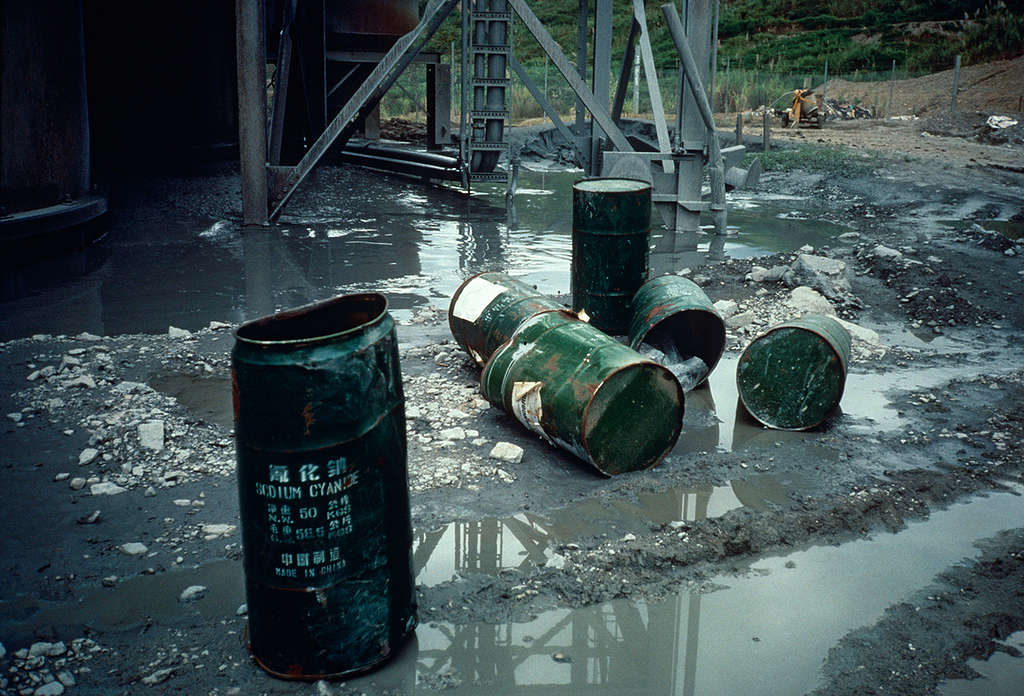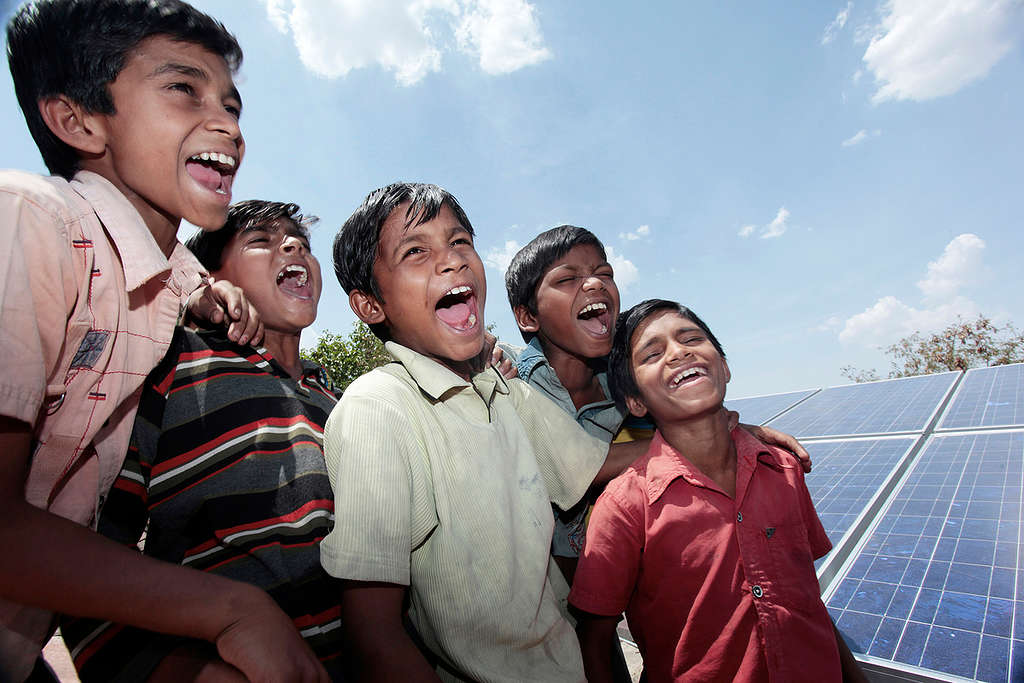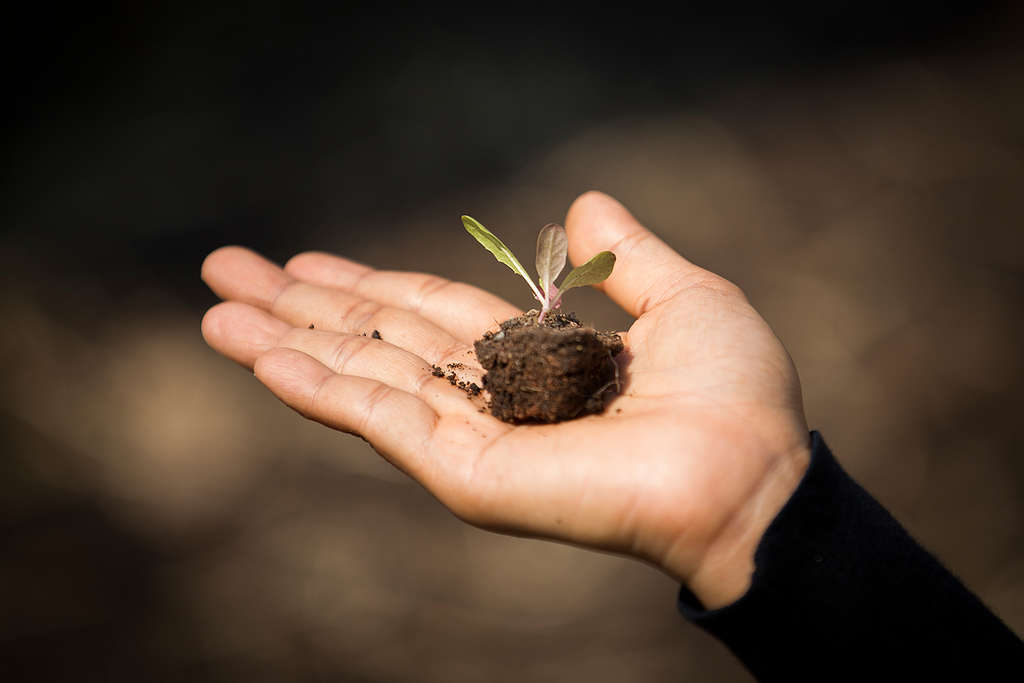What a Green and Peaceful Future Could Look Like
IN FOCUS, 23 Jul 2018
Paula Tejón Carbajal | Greenpeace – TRANSCEND Media Service
“We cannot solve problems with the same kind of thinking that created them.”
— Albert Einstein
19 Jul 2018 – I started at Greenpeace ten years ago. 2008 doesn’t seem that long ago, but the world was a very different place back then. “Tweetstorm” wasn’t a word; Wikipedia and the democratization of knowledge were utopian ideals, and social media addiction wasn’t listed as a psychological disorder.
Technology has changed our lives at a pace never experienced before. The global economic crisis, Trump, the refugee crisis, Brexit… these are just some of the symptoms of a broken system. Its demise has been accelerated, and in some cases triggered by the digital innovations of the past decade. There is a clear detachment between technology and our current societal needs.

Leaking drums of sodium cyanide at an open-pit gold mine in Papua New Guinea. © Glen Barry / Greenpeace
We’re experiencing a deep systemic disconnection: an ecological, social and spiritual cultural divide. There’s a discernible disconnect between the infinite growth imperative and the finite resources of planet Earth; between private ownership and the best societal use of property; between gross domestic product (GDP) and well-being.
But the failure of our current socio-economic system has also brought a strong desire to change the world and co-create a better one. The Arab Spring, Los Indignados and Occupy Wall Street spread new value systems and sparked political and economic initiatives that questioned the prioritization of profit over people and the endless growth paradigm. These movements used technology to envision a new, more inclusive, equitable economic system that operates within the environmental limits of our planet.
Sharing and circular economies were attempts in this direction. They started in response to the economic crisis as people were pushed to utilize excess capacity, time and goods and companies started to suffer from the impacts of climate change and resource scarcity. Unfortunately, as with many other ideas, they’ve been hijacked by the private sector and its main driver; growth. The idea of a circular economy carries a rebound effect; meaning we could end up increasing overall production, which would offset any benefits.
The environmental crisis can’t be addressed in isolation; concepts like the sharing and circular economy will only work if they are integrated into wider strategies for economic system change.
Just imagine…. What if we shaped a new economy to:
Put people over profit
Prioritise people and the environment over narrow and short-term economic interests. Serve the health and wellbeing of people and other life forms, environmental sustainability, and social justice instead of undermining them in the name of growth. Promotes justice, accountability and transparency in political and economic processes.
Include everyone
Treat unpaid caregivers and parents raising children as contributors to society in their own right. Maintain the commons; a space where communities can organize to manage a resource they care about based on their own rules, rather than one defined by the market or the state.
Reinvent institutions and structures to be less hierarchical and more inclusive; democratizing knowledge, information and resources, distributing power and decentralizing energy and food systems. Recognise human diversity while giving everyone equitable opportunities regardless of race, nationality, ethnicity, language, religion, sexual orientation, gender, social class, age and mental or physical ability.
Share resources
Distribute the ways we create and exchange goods, to redistribute wealth in an equitable way. New business models (like cooperatives, user-owned platforms and peer to peer lending and repairing networks) can be enabled by breakthrough technologies (like Blockchain, the Internet of Things and 3D printing) that, if used properly, have huge potential to soften how we view ownership.

Students from the Government school in Jalka, India, shout out for more solar power in their village. © Peter Caton / Greenpeace
Put experiences above things
Offer an alternative vision of living based on civic participation, affiliation, universalism, and shared experiences, providing an antidote to consumerism. Measure economic success, not just in the quantity of goods and services produced (GDP), but in contributions to preserving public resources and welfare.
Be genuinely sustainable
Put regeneration at the core of how we exist, and manage our finite resources with care: by protecting biodiversity, using renewable energy for all our power, growing our food ecologically, and travelling with greener public transport. We can prevent pollution and eliminate waste by putting reduction and reuse first.
Limit economic activity
This would mean:
- Maintaining vast marine reserves, ocean sanctuaries, protected forests and wildernesses treasured for the sake of being wild.
- Drastically reducing the size and influence of the finance industry on the economy, abolishing harmful practices and financial products.
- Establishing regulations to penalize violations of ecological and human rights, and to control private use of common goods.
- Creating a fair trade system oriented towards public welfare and the improvement of environmental and social standards worldwide, ending the neoliberal free trade regime that promotes deregulation and private tribunals for corporations.
Allow more free time
End our obsession with working time and encourage a more equitable sharing of work by reducing working hours for individuals. Free people, resources and energy from market productivity pressures and consumption, to spend more time on the things that matter to us.
Spread the wealth
Make those who accumulate the most wealth, use the most resources and energy, produce the most waste and pollution, engage in financial transactions and harmful speculation and other activities detrimental to public interest and the common goods, pay the most tax. Shift the burden of taxes away from labor and wages, and end subsidies for companies that are environmentally or socially harmful.
This would be a new system that works for the many and their environment instead of just the few. One that moves away from a throwaway culture and consumerism. One which is simultaneously free (open knowledge), fair (inclusive of all cultures) and sustainable (embedded in ecological realities).
Does all this sound too utopian and idealistic? If we want to build a new economy and the next system, we need to gather the courage and dare to think differently to solve our new challenges.
New thinking will bring a new consciousness and hope for a world where we, as human beings, reconnect with our planet and with other each other.
What future do you want to see? Share your vision of hope in the comments.
_____________________________________________
Paula Tejón Carbajal is a Senior Campaign Strategist with Greenpeace International.
Go to Original – greenpeace.org
DISCLAIMER: The statements, views and opinions expressed in pieces republished here are solely those of the authors and do not necessarily represent those of TMS. In accordance with title 17 U.S.C. section 107, this material is distributed without profit to those who have expressed a prior interest in receiving the included information for research and educational purposes. TMS has no affiliation whatsoever with the originator of this article nor is TMS endorsed or sponsored by the originator. “GO TO ORIGINAL” links are provided as a convenience to our readers and allow for verification of authenticity. However, as originating pages are often updated by their originating host sites, the versions posted may not match the versions our readers view when clicking the “GO TO ORIGINAL” links. This site contains copyrighted material the use of which has not always been specifically authorized by the copyright owner. We are making such material available in our efforts to advance understanding of environmental, political, human rights, economic, democracy, scientific, and social justice issues, etc. We believe this constitutes a ‘fair use’ of any such copyrighted material as provided for in section 107 of the US Copyright Law. In accordance with Title 17 U.S.C. Section 107, the material on this site is distributed without profit to those who have expressed a prior interest in receiving the included information for research and educational purposes. For more information go to: http://www.law.cornell.edu/uscode/17/107.shtml. If you wish to use copyrighted material from this site for purposes of your own that go beyond ‘fair use’, you must obtain permission from the copyright owner.
